INSIGHTS: The Best Foods for Bluewater Sailing
Alison Gieschen and her husband Dan are half-way through a planned 10-year sailing odyssey around the globe and have found out, like many cruisers living at sea, how little they really need. In this latest article for Noonsite’s INSIGHTS series, Alison explains why this premise also applies to provisioning.
Published 2 years ago
“At sea, I learned how little a person needs, not how much.”
Robin Lee Graham
When we first moved aboard our Taswell 43’, cast off the dock lines, and headed out to sea, every cabinet, every bilge, every empty pocket of space aboard our boat was filled with stuff we thought we couldn’t live without. Five years later, we have gradually pared down and have much more room to live comfortably. When living at sea, you do learn to accept how little you really need. This same premise, believe it or not, applies to provisioning.
My goal was to pack my boat full of sustainable food sources. If we ever got stranded on a desert island, or stuck out at sea for months at a time, I wanted to have enough food to survive. The more we sailed, the more I realized that those scenarios had even the slimmest chance of occurring. We have now landed upon the shores of 43 countries on four continents. Not one of those places, even the most remote islands, was devoid of opportunities to buy food.
Our mentor and offshore educator, John Kretschmer, warned us of the phenomenon of new sailors packing to the hilt with food they would never need, but some lessons have to be internalized on one’s own. We’ve grown, we’ve adapted and most of all, we’ve realized that packing food should be approached with reason and practicality.
I’m sharing what I’ve learned so you won’t open your cabinets and find expired cans, stale crackers, or unused 10-pound bags of rice in your bilge. Even though you may want to hoard, take a deep breath and provision with reason.
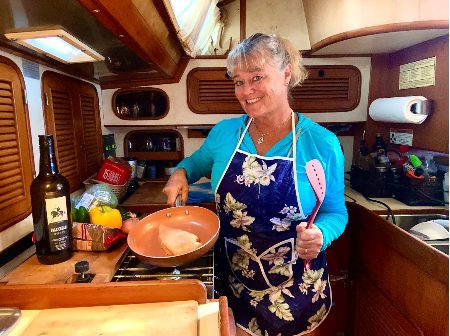

Food You Don’t Need on Your Boat
Is this even possible? Is there food that will be taking up precious space on your boat and clogging your cabinets? You bet. And don’t just take it from me. Our fellow blue water friends have also experienced this phenomenon. It’s been a topic of discussion during more than one cockpit Captain’s Hour.
Rule number one. If you don’t eat it on land, you won’t eat it on your boat. I thought that those tins of sardines, spam, ham, and copious amounts of canned chicken and tuna would save our lives someday. Five years later, I’m now throwing out the sardines, spam, and ham. I’ve used maybe a fourth of the chicken and tuna.
Rule number two. You are going to prefer to eat fresh food. I bought bags of powdered butter, cheese, cream, and cream cheese, you know, the kind you just add water to and voila, they magically appear. They all went bad after sitting in my cabinet, unused, for three years. (The only powdered product I do use, is powdered milk, mostly for recipes that call for milk.)
Rule number three. Overpacking your fridge or freezer is a bad idea. Stuffing food into it creates less space to find the things you need. Overstocking means having to throw food out that goes bad before you get a chance to use it. Unless you are on a several-week voyage, you will prefer discovering local foods, shopping at local markets and exploring grocery stores, just for fun – something I never, ever did when I lived on land.
Discover Your Inner Foodie
On land, I hated food shopping and cooking. Now, I’m the boat that hosts happy hours and dinners. I even have cooking in the galley YouTube videos! Every time we pass a market, I beg my husband to go in ‘just for fun’ because you never know what new foods are to be discovered. For me, perusing food stores in new countries is like treasure hunting. It definitely brings out the food pirate in me.
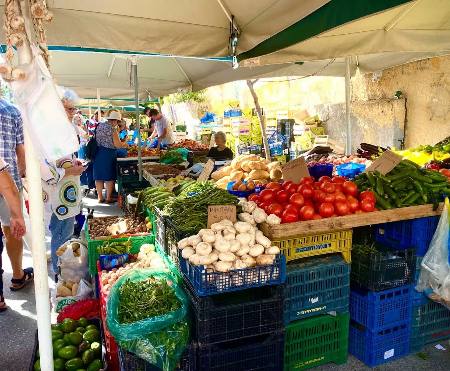

The real reason I have become such a foodie is that we are on a budget and can’t afford to constantly eat out. We reserve that as a special treat. Also, I now have time to experiment and discover new culinary delights. It’s a great way to occupy hours between destinations. I even have fun making YouTube videos with some of my favorite recipes. If you’re interested in knowing what my favorite galley essentials are, check out our Sailing Equus channel: In the Galley Cooking Essentials.
Worried about having fresh bread aboard?
Guess what I discovered – the magic of sourdough! I have learned to bake everything from fresh baguettes to scones and pizza crusts, as well as the best-tasting biscuits ever using my readily available sourdough starter. If you’re not a fan of sourdough, all these recipes can be made the traditional way with yeast.
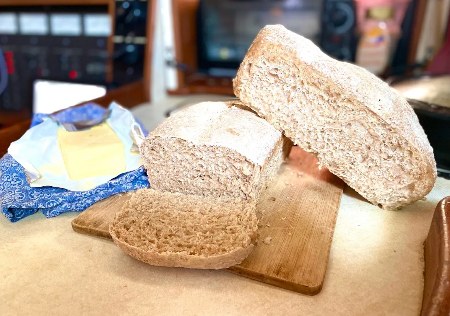

Some of my other favorite additions to our pantry include homemade kombucha, sauerkraut, growing my own herbs, and sprouts. You will never run out of something fresh and healthy to eat if you make sprouts. They are so simple, ready in a few days, and packed with nutrition.
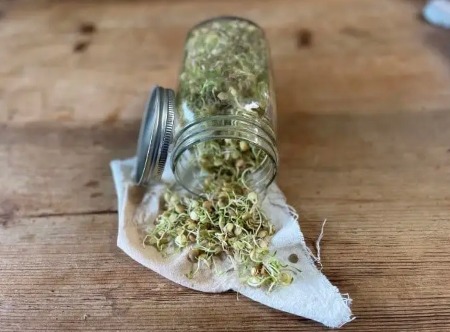

Plan your meals
There are definitely foods that keep well over a long period of time and those that will become that miserable mush in your ice box in a matter of days. Short term, buy your favorite foods and plan to shop every few days to make life in the galley easier. Meal planning allows you to buy just what you need. Your icebox will be easier to navigate and food will be less likely to spoil if you don’t have a freezer.
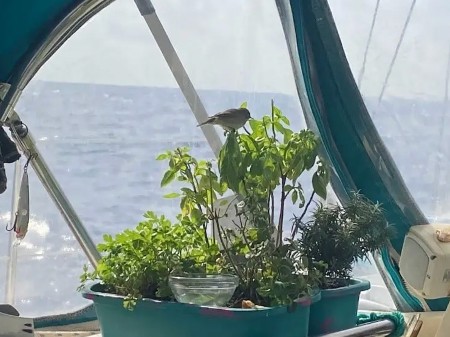

When preparing for a multi-day crossing, you might want to consider foods that have the stamina to make the crossing with you. Our longest passage to date was 16 days at sea. We departed from Bermuda and set our course for the Azores. I had packed our fridge full of food and had enough food to last us a month. Lo and behold, we caught a gigantic tuna an hour into our passage. Now what? I had fifteen pounds of tuna to contend with and no freezer.
Dealing with fresh fish
Before I was out of cell range, I called my sister back in the US and begged for her help. “How can I preserve all this tuna without a freezer!” I asked in a panic. Thankfully, my sister, Carol Land, is a homesteader and there are no food issues she can’t tackle. She gave me the instructions that saved my tuna.
Of course, we had fresh tuna for lunch that day. I put a few steaks in the fridge which had to be eaten in the next few days. Then, I cooked the tuna in oil, garlic cloves and fresh rosemary. I packed the cooked tuna into jars filled with oil. I now had canned tuna that would last in the fridge for weeks.
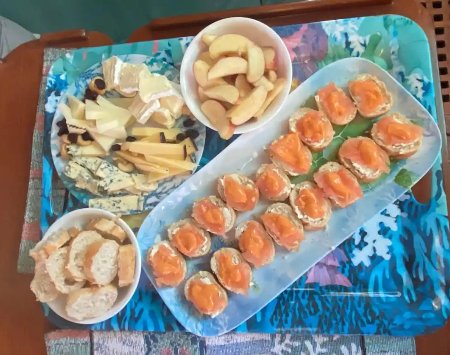

The conundrum involved the casseroles and fresh meat I had planned to eat the first few days of the passage. It was now replaced with tuna. Good intentions and planning aside, I ended up having to throw away prepared food.
Foods that last
If you are sailing and fishing, you are bound to catch fish and should factor that as a possibility for what you plan to eat for passages.
Otherwise, here is a list of the foods that last the longest and can supplement your canned or frozen meats, veggies, rice, and pasta.
- Hardy Fruits: Certain fruits like apples, oranges, and grapefruits can last for several weeks if stored in a cool, dry place. They are less prone to spoiling quickly compared to softer fruits.
- Citrus Fruits: Lemons and limes are not only versatile for cooking but also tend to last longer due to their thick skins and high acidity.
- Carrots: Carrots can stay fresh for a while when kept in a cool, dry environment. They’re great for snacking or adding to meals.
- Cabbage: Cabbage is hardy and can stay fresh for a longer time compared to more delicate leafy greens, and there are tons of amazing cabbage recipes.
- Potatoes: Potatoes are known for their long shelf life. Keep them in a dark, cool place to prevent sprouting.
- Onions and Garlic: These aromatic essentials can last for several weeks or even months when stored properly in a dry, well-ventilated area.
- Squash: Varieties like butternut or acorn squash can last for weeks and are versatile for various dishes.
- Sweet Potatoes: Similar to regular potatoes, sweet potatoes have a relatively long shelf life and are packed with nutrients.
- Hard Cheeses: Cheeses like cheddar, Parmesan, or Manchego can last for weeks without refrigeration, as long as they’re kept in a cool, dry place.
- Eggs (Unwashed): Unwashed eggs with their natural protective coating intact can last longer at room temperature.
- Dried Fruits: While not fresh, dried fruits like raisins, apricots, or dates can provide a burst of natural sweetness and energy for an extended period.
- Nuts: Nuts are nutrient-dense and have a relatively long shelf life. They make for great snacks and add crunch to meals.
- Jerky: If you have access to a source of jerky, whether it’s meat, fish, or plant-based alternatives, they can provide a good source of protein that keeps well.
Supplement these items with your homemade bread, sauerkraut, and fresh bean sprouts and you will be eating well for the duration of your voyage. Consider growing a herb garden in pots or shallow containers that you can keep under a porthole or in your cockpit.
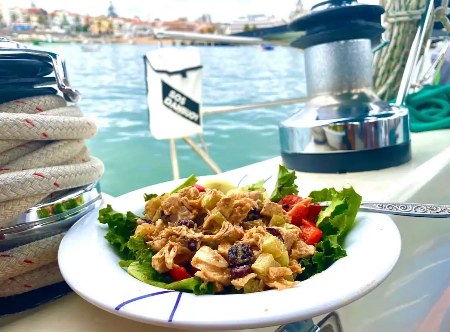

Plan practically and minimally
Remember, it’s not about quantity when it comes to provisioning for blue water cruising. Of course, you want to have a few goodies packed away for an impromptu Captain’s Hour with unexpected guests. The majority of the time, you will be able to plan your meals a few days at a time and have the freshest and best selection of food from whichever shoreline you are presently harbored.
Plan practically and minimally. Keep the basics in your cupboard and always have some long-lasting food like rice and pasta stored in case of a long-term emergency. Experiment with sustainable options like learning how to fish, baking your own bread, growing herbs, and sprouting beans. Otherwise, don’t stash food – it will go stale.
Live for each day, enjoy each moment, eat fresh, and love the heck out of your life. You are one of the few, the proud, the happiest people on the planet – a blue water cruiser.
Happy sailing!
Fair winds,
Alison and Dan
S/V Equus
…………………………………….
About the Author:
Alison Gieschen met her husband Dan in 1985 in a sailboat race in New Bern, North Carolina. After learning they both shared a passion to someday sail around the world, they fell in love, got married and raised a family. When the children were all grown up, Dan and Alison embarked on their sailing adventure, Their plans include visiting every continent and living aboard their sailboat for 10 years.
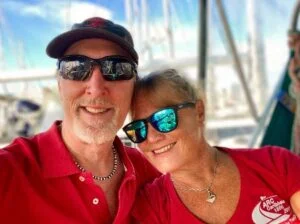
Read Alison’s other articles on Noonsite:
- Encountering Nudity when Cruising.
- Five Blue Water Cruising Essentials for Sailing Comfort.
- Six Boat Items that Make Life Easier.
- Why Sailing Makes you Healthier.
Read more about their voyages:
Watch their videos:
Sailing Equus YouTube Channel.
…………………………………
The opinions expressed in this article are the author’s own and do not reflect the view of Noonsite.com or World Cruising.
…………………………………
Find out all news, reports, links and comments posted on Noonsite, plus cruising information from around the world, by subscribing to our FREE monthly newsletter. Go to https://www.noonsite.com/newsletter/.
Related to the following Cruising Resources: Books, Cruising Information, Equipment, General, Insights, Planning and Preparation, Provisioning



Funny stories but
It seems most americans are more afraid of nudity than weapons.
What’s the big deal